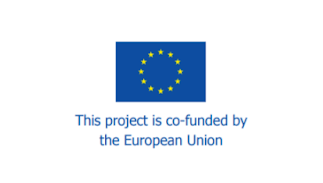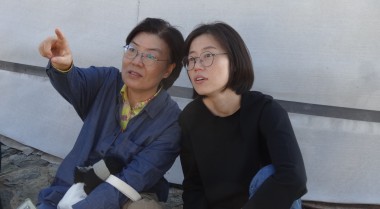
Every voice matters for peace on the Korean Peninsula: Jennifer Deibert on US-DPRK relations and what the US could do better
In this series, we highlight the diverse voices of people passionately building peace on the Korean Peninsula as part of the Ulaanbaatar Process (UBP). Named after the Mongolian capital in which it was officially launched in 2015, the Ulaanbaatar Process is a unique civil society dialogue for peace and stability in Northeast Asia (NEA). This story features Jennifer Deibert, DPRK Program Director for American Friends Service Committee, who tells us how 70 years of division and militarization of the Korean Peninsula have made the "abnormal" become "normal" and what can be done to change this highly dangerous situation.
Jennifer Deibert has a long experience working in Asian countries - she lived in Vietnam, was engaged in educational projects in China, and lived in Chuncheon in the Republic of Korea from 2014 until 2021. It was somehow natural that Jennifer wanted to get to know the Democratic People's Republic of Korea (DPRK), to visit this country and learn more about its people. And she managed to do so.
"The more I learnt about the involvement of the US in the Korean Peninsula, the more I wanted to become a part of change and to heal some of these wounds from the past", says Jennifer.
"Living in Chuncheon, in Gangwon Province (the only province on the Korean Peninsula divided in two parts by the Demilitarized Zone/DMZ since 1953), I learned how destructive this division is for so many people. People and families are cut off by this border! It is such a short distance to one of the project sites in the DPRK, but when I went there for the first time, I had to travel through China and then to Pyongyang, before I was on the other side of the DMZ. It was so surreal! That all formed my readiness to help this situation to become a bit better".
Jennifer travelled many times to the DPRK, managing projects with local cooperative farms and the Academy of Agricultural Sciences. AFSC has maintained engagement with the DPRK since 1980. "My last trip there was in 2019", says Jennifer. "As soon as the borders are open, I hope to travel back to the DPRK. Seeing the same people, building trust and relationships - I am looking forward to continue engaging DPRK partners when the time is right."
For Jennifer, the lack of trust and understanding between the USA and the DPRK is one of the root causes of instability on the Korean Peninsula: "The USA is not trying enough to show goodwill for dialogue and trust-building measures." She believes that several first steps from the part of the USA could open a dialogue and readiness to decrease actual military threats and political tensions: for example lifting the current travel ban to the DPRK for USA citizens, reevaluating the effects of sanctions on the civilian population, and establishing a liaison office of the USA in the DPRK. "I hope both countries can embrace these bridges of understanding and find the middle ground where we all together can start to work for a peaceful future", says Jennifer
The deployment of nuclear-capable equipment by the U.S. on the Korean Peninsula only fuels the existing danger of armed conflict, explains Jennifer further: "In my advocacy work, I am always bringing back voices from the Korean peninsula to the U.S. and sharing how civil societies and people in NEA do not want constant militarization of the region and fear of nuclear war".
Jennifer was part of the Ulaanbaatar Process delegation, which visited political centres and civil society partners in Washington DC, New York, Brussels and The Hague in December 2022 to raise awareness of the Ulaanbaatar Process and advocate for a regional peacebuilding approach for NEA: "I think our group was unique in its diversity and capacity, that definitively attracted attention in the meetings we conducted. It was powerful, we received a good reception, and I hope we were heard and some of our points were taken into account."
The support given by the EU to the UBP is something that Jennifer would like to see from the USA too.
"When I went to the EU in Brussels with the UBP delegation and learnt about how the EU was founded as a peacebuilding project, I was so astonished that I was never taught that in history class in the U.S. Civil society dialogue has an important place at the table, especially in entrenched conflicts. Because many EU countries and the EU itself have established diplomatic relations with the DPRK, the support of the EU for the UBP fits in well with the overall goals of the European Union to prevent war and conflict."
The year 2023 will mark the 70th year of the Korean division and the existence of the DMZ. Jennifer is afraid that people will begin to think that this situation is just how it has always been, "We cannot start taking these abnormal conditions of the forced division and permanent state of unfinished war for so long as normal. Over the years, the USA has formed partnerships with many countries which were historically adversaries, like Vietnam, Germany and China. Hopefully, the relations with the DPRK will also heal and normalize soon."
Jennifer Deibert is based out of Reedley, California, and is currently working for American Friends Service Committee (AFSC) as DPRK Programme Director. Through AFSC's Washington DC Office of Public Policy, her work also includes advocacy in the United States promoting AFSCs engagement in the DPRK and peace initiatives from Northeast Asia civil society.
For more reflections from Jennifer Deibert on the involvement of the USA on the Korean Peninsula, please read her chapter in the publication issued in September 2022 as part of the Ulaanbaatar Process here: Sanctions and Seven Decades of War; The Dangers of the Abnormal Becoming Normal, in Peace and Security in Northeast Asia – The New Normal?

This article was prepared in the frame of the project "Ulaanbaatar Process: A Civil Society Approach to Building Peace in Northeast Asia", implemented by Peace Boat and Blue Banner, in cooperation with the GPPAC Foundation, co-funded by the European Union.
